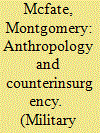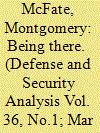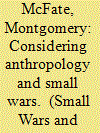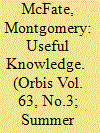| Srl | Item |
| 1 |
ID:
062598


|
|
|
|
|
| Publication |
Mar-Apr 2005.
|
|
|
|
|
|
|
|
|
|
|
|
|
|
|
|
| 2 |
ID:
179027


|
|
|
|
|
| Summary/Abstract |
This article argues that the US Navy’s roles (which have historically been bifurcated between warfighting and political use of force) manifest in its organisational culture as two different concepts of war: the US Navy as diplomatic actor and the US Navy as warfighting force. The conflict between these different concepts of war can be seen in the current debate about the definition and function of presence. The debate about presence is not just theoretical, but represents a deep and enduring conflict within the Navy as an organisation about its concept of war. Since the end of WWII, the Navy has been designing its fleet architecture according to a Mahanian concept of war, despite the preponderance of non-lethal missions and activities. The result is a mismatch between platforms and tasks.
|
|
|
|
|
|
|
|
|
|
|
|
|
|
|
|
| 3 |
ID:
173830


|
|
|
|
|
| Summary/Abstract |
Almost every war since the origins of the discipline at the beginning of the 19th century has involved anthropology and anthropologists. In some cases, anthropologists participated directly as uniformed combatants. Following the philosopher George Lucas, one might call this ‘anthropology for the military,’ having the purpose of directly providing expert knowledge with the goal of improving operations and strategy. In some cases this scholarship is undertaken, anthropologists have also studied State militaries, which following George Lucas might be considered ‘anthropology of the military.’ Sometimes this scholarship is undertaken with the objective of providing the military with information about its own internal systems and processes in order to improve its performance. At other times, the objective is to study the military as a human group to identify and describe its culture and social processes. Both ‘anthropology for the military’ and ‘anthropology of the military’ tend to have a practical, applied aspect, whether the goal is improving military effectiveness or influencing national security policy. On the other hand, anthropology as a discipline has also had a long history of studying warfare itself, known as ‘the anthropology of war.’ The papers in this special edition fall into these myriad categories of military anthropology.
|
|
|
|
|
|
|
|
|
|
|
|
|
|
|
|
| 4 |
ID:
170163


|
|
|
|
|
| Summary/Abstract |
Christiaan Snouck Hurgronje (1858-1936), a Dutch scholar of Islam, served as a “military anthropologist” during the Aceh war in the Dutch East Indies. The Acehnese fighters viewed their anti-colonial struggle against the Dutch as a jihad, construing themselves religious martyrs fighting “infidel invaders,” and carrying out suicide attacks with a machete or dagger. To combat this insurgency Snouck Hurgronje, one of the first Westerners to visit Mecca and author of many books on Islam, developed the so-called “Aceh method,” which became the basis of modern Dutch counterinsurgency strategy. This article addresses the question: what can we learn from the life and times of Snouck Hurgronje?
|
|
|
|
|
|
|
|
|
|
|
|
|
|
|
|